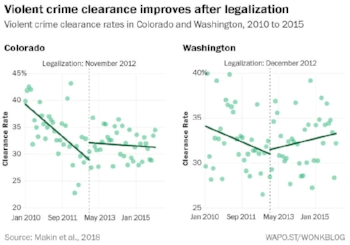
“Our models show no negative effects of legalization and, instead, indicate that crime clearance rates for at least some types of crime are increasing faster in states that legalized (weed) than in those that did not.”
So says a report released in July in a publication called Police Quarterly, an online academic journal published in association with the Police Executive Research Forum and the Police Section of the Academy of Criminal Justice Sciences to provide police-related, policy-oriented research to the public.
The report was authored by researchers from Washington State University who examined Washington and Colorado and determined that the two states’ moves to legalize the adult recreational use of cannabis in 2012 “produced some demonstrable and persistent benefit” in regard to non-weed-related crime clearance rates by local law enforcement.
In law enforcement terms, a crime is considered “cleared” once a suspect has been arrested and sent to the judicial system for prosecution.
Though voters passed the new legalization laws in 2012, they did not take effect in either state until 2014, but both had already begun to ease the laws for personal use and possession shortly after the elections in ’12 so the study took monthly FBI crime data from dates between 2010 and 2015 and researchers dug in.
What they found was that prior to cannabis legalization in both states, crime clearance rates for violent crimes were falling hard. In other words, fewer and fewer of these crimes were ever being solved and the trends did not look promising.

Once weed was legal in the two states, Colorado’s clearance rates for violent crimes leveled off and Washington’s completely reversed itself seeing more violent crimes receive justice than they had in years.
Cannabis critics claim that the numbers are some sort of anomaly, and some actually put forth the argument that maybe the cops just started focusing on those violent crimes instead.
Yeah, no shit!
That’s what we want them doing.
Since each state has its own view of cannabis and relatively few have gone as far as Colorado and Washington, the same reversal has not been seen on a nationwide scale where the downward trends continue and more crimes are left unsolved.
Regardless of what type or category of crime they applied their studies to none of them saw a negative impact on clearance rates post-legalization.
It doesn’t take a Ph.D. to know that when you incentivize cops with big bucks from private prison systems and the equally corrupt practice of asset forfeiture, they are going to go after the easiest prey they can find – non-violent cannabis users.
Every minute they spend raiding dispensaries or shaking down stoners is a minute they are not spending on burglaries, sexual assaults, murder, or anything else that will involve real police work.
The Washington State University research group agrees, stating, “Our results suggest that, just as marijuana legalization proponents argued, the legalization of marijuana influenced police outcomes, which in the context of this article is modeled as improvements in clearance rates.”
The more we learn about the cannabis plant, the safer it becomes. For the states that have taken the remarkable steps to legalize the recreational use of the plant, it appears that it is making the streets safer as well.

Sign up for Friday Sesh here.


















